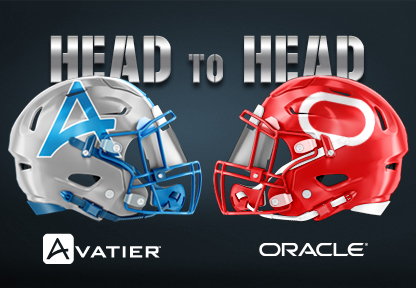In your single sign-on software research, Avatier and Oracle Enterprise Single Sign-On are two promising options. If you’re considering these products for your shortlist, how should you think about comparing them? Use our product comparison guide to identify which solution is better for you.
1) Avatier vs. Oracle Pricing: What Are The Pricing Structures?
Some SaaS companies are known for offering highly complex licenses and pricing arrangements. Insisting on complex pricing makes life more difficult for the buyer. In some cases, it might be worth choosing a software provider even if their pricing is complicated, but that decision should not be taken lightly.
With Avatier, you benefit from a simple pricing model. As shown on the Avatier pricing page, the company offers a simple pay-per-user per-month model. That means you start with a small-scale pilot at a low cost before deciding to roll out across your organization. Besides, Avatier offers special pricing for educational institutions and organizations purchasing more than 3,000 licenses.
In contrast, Oracle’s pricing structure is less transparent. On the Oracle Single Sign-On product website, we could not find an explanation of their pricing. That suggests that customers will have to reach out to the company for the information. If you’re in a hurry to develop your business case for single sign-on, having to request pricing data may not work for you.
Resource: Evaluating pricing on its own does not mean much. Instead, consider product pricing as one factor in your single sign-on business case. Use our guide to developing a single sign-on business case so that you win funding and management support for your single sign-on project.
2) Oracle vs. Avatier: What Directories Do They Support?
When you select a single sign-on software tool, compatibility with your directory solution is critical. Let’s look at each product at a time.
Avatier’s support directories are extensive. Microsoft Active Directory, IBM Directory Server, and OpenLDAP. Avatier also provides support for Oracle Unified Directory.
In contrast, Oracle’s support for directory services looks a bit different. Supported products include Microsoft Active Directory, Oracle Directory, Tivoli Directory Server, and OpenLDAP Directory Server.
Ultimately, both products have broadly similar support in terms of directory support. However, if you use a less common directory system not mentioned above, you will need to contact Oracle and Avatier directly to see what they can offer.
3) Avatier vs. Oracle: Training And Change Management Complexity
Changing your IT security software is no small project. If you make mistakes, you might expose your company to more significant security exposures. Therefore, the complexity of the product you implement can make single sign-on easier or harder.
Starting with Oracle, training, and complexity is a serious issue to consider. At the company level, Oracle offers many different types of enterprise software products. As a result, the company has developed a full suite of certification programs. If you are already an Oracle user and have staff fluent in their technology, these certification programs will be helpful. Otherwise, the sheer complexity of Oracle’s products and training poses a barrier. For example, there are eight different Oracle product certification offerings. While that depth of training is admirable, you also need to recognize the amount of work effort it represents.
In contrast, Avatier takes a different approach to training and related services. Since Avatier’s single sign-on product is relatively less complicated, there is no need to send your staff to complete specialized training. That means you can complete your single sign-on implementation faster.
4) Oracle vs. Avatier: How Do They Compare With Multi-Factor Authentication Support?
When you simplify password administration through a single sign-on, your security task is not done. To secure highly sensitive systems, you need to offer multi-factor authentication (MFA) support.
Avatier makes it easy to implement MFA by offering support for multiple technologies. As of today, you can use Radius, Google Authenticator, DUO Security, Biometrics, Symantec, SAML, one-time passcodes by SMS, and ActivCard. For more details on the MFA technologies supported by Avatier, visit our architecture page.
In contrast, Oracle supports multi-factor authentication differently. For example, the product includes support for smart cards and proximity cards. These hardware devices are helpful. However, there appear to be limitations. For instance, Oracle documentation provides limited detail regarding support for biometrics.
For companies that need sophisticated biometric support in their MFA toolkit, Avatier is the better choice.
5) Oracle vs. Avatier: Which Company Empowers End-Users?
A single sign-on software solution is meant to make life better for your end-users. That’s why it makes sense to look at related offerings that make life easier for business users.
With Avatier, you get an IT security chatbot called Apollo. This service makes it simple for employees to request password resets and related changes according to your password policy. That means fewer requests to your help desk, a critical benefit in a time when IT is overloaded, helping with remote work. Even better, Apollo integrates with collaboration tools like Slack and Skype so your employees can get their jobs done using familiar tools.
While Oracle offers a range of identity management products, there is nothing quite like an IT security chatbot. Without extensive product demos and discussions, it is difficult to tell whether or not Oracle’s identity and access management technology will make it easier for your employees.
What To Do After You Create Single Sign-On Software Short List
If you already have extensive experience with a range of Oracle products, there is a clear reason to choose Oracle’s single sign-on solution. However, that level of background experience and familiarity with a brand should not be the only deciding factor.
To help you make a smart decision, we have two recommendations. First, use vendor selection criteria to evaluate the vendors on your shortlist. Second, engage your stakeholders like managers, business users and corporate departments like human resources in the selection process. Taking this thoughtful approach to vendor selection means you will make a better decision.




